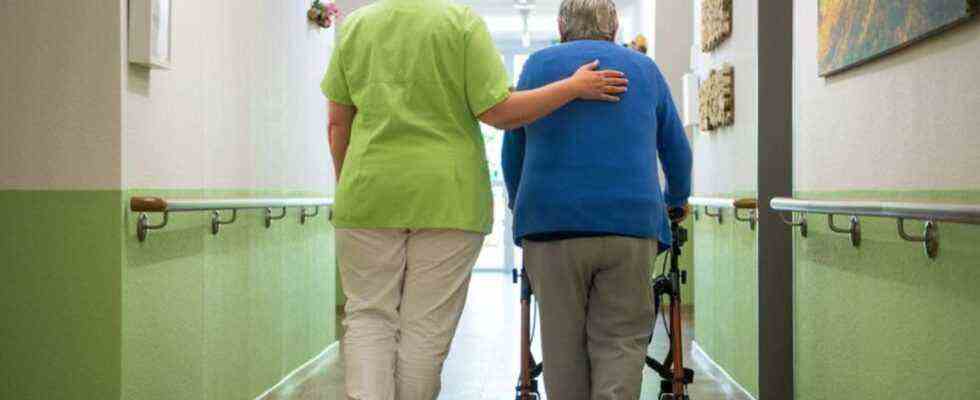study
Nurses are fleeing the job in droves
A nurse walking down the hall with a resident of a retirement home. Photo: Sina Schuldt/dpa
© dpa-infocom GmbH
In the corona pandemic, they received applause: the nursing staff. But better pay, better working conditions? none. Many of those affected could now draw consequences from this.
Poor pay, high stress and not enough time for old people: According to a new study, many nursing staff in Germany want to give up their jobs.
40 percent of those surveyed are considering leaving the profession, said Bernadette Klapper, Managing Director of the German Professional Association for Nursing Professions, on Thursday about the study “Focus on the Elderly,” which was initiated together with the geriatric care publisher Vincentz Network. «This is alarming. We need a turnaround in geriatric care.”
A total of 686 employees in inpatient care were surveyed for the study in August and September 2021. At the same time, the Bertelsmann Foundation criticized the fact that important information on the quality of nursing homes, such as staff deployment, is available in all countries but is often kept secret and is not made available to consumers. People who are looking for a nursing home would be deprived of information on essential selection criteria.
Experts: By 2030, around 500,000 nursing staff could be missing
According to the specialist publisher, experts calculated that around 500,000 nursing staff will be missing by 2030. 73 percent of those surveyed said that the shortage of staff had worsened in the past two years, i.e. in the middle of the corona pandemic. In 2018, 71 percent said this. 68 (2018: 60) percent judged that it was becoming increasingly difficult to provide good care. This is also related to the fact that there is not enough time for the residents, according to 67 (2018: 65) percent of those surveyed. 56 percent said new rules on quality testing would create more bureaucracy.
Employees take these worries home with them, as the study found that more than one in two employees felt the negative impact on family and private life. In addition, the challenges and effects of the corona pandemic have been a burden for the past two years. According to the information, 96 percent of those questioned did not even believe that politicians had understood the situation and were trying to improve it.
According to the study, a total of 67 percent of those surveyed are planning a career change – either through higher qualifications in nursing (41 percent), studying (14 percent) or changing to another employer (22 percent). According to 90 percent of those surveyed, retaining or recruiting more skilled workers in geriatric care can only succeed if more staff are hired. If it is not possible to improve staffing, the existing staff cannot be retained – and potential additional staff will be deterred.
Situation gets better with better pay
Klapper then called for a whole bundle of measures – more staff, better salaries and a reform of long-term care insurance. According to the study, only 8 percent of those surveyed stated that their salary had improved significantly in the past two years, 38 percent judged that the situation in nursing would only improve if nursing staff were better paid.
Prof. Herrmann Brandenburg, holder of the chair for gerontological nursing at the Vallendar University of Applied Sciences, emphasized that the problem is not just that nurses earn too little. They also experienced the dilemma of a mismatch between what they understood to be good care and the fact that they were controlled by others. In this context, he criticized private chains on the German market, where there are often quality problems. The private sector must be scaled back, he demanded. Recruitment abroad is also a “poor sign”.
The head of the German Foundation for Patient Protection, Eugen Brysch, told the German Press Agency that more than two-thirds of geriatric nurses doubted that they could provide good care. “The victims of this misery are 820,000 nursing home residents and over a million people who are also cared for at home by an outpatient service,” says Brysch. He called for a sustainable and attractive concept to keep people in the job: “It must also be clear that, unlike professionals, those in need of care cannot escape their fate.”

